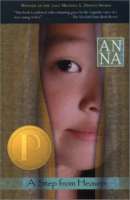
A Step from Heaven
Written by An Na
Speak, 2003, 160 pp.
ISBN: 978-0142500279
A Step From Heaven is the first published novel crafted by An Na, an immigrant who grew up in the United States and became a middle school teacher before pursuing writing full time. She has an MFA from Norwich University. Growing up in California, she felt many of the same cultural issues experienced by the protagonist, Young Ju and her younger brother, Joon.
From the second page of the novel where An Na describes her grandmother as old with “a sleepy blanket face,” it is obvious that her words create a lyrical story. In addition, Korean words are woven into the context of the story and are often discernable without translation. The titles of the clever short chapters (usually no more than two pages) sometimes lead the reader and sometimes cause an “aha” moment at the end of the chapter, drawing on the reader’s ability to infer. Although An Na unfurls the story chronologically, she adds a circular element when the next to the last chapter ends with a same line from the introductory chapter. So, while the vocabulary is not difficult for middle school readers, the sophistication of text adds enjoyment and complexity. In many ways this book reminds one of When the Emperor Was Divine (Julie Otsuka, 2003) with its deep but simply written message.
The story takes Young Ju from the age of four until she goes to college but does not stop along the way each year, which would have bogged down the story. Her experiences over time are important in the sequence of her life, but stopping to relay events in all the years is not necessary for the reader to understand how she and her family relationships develop.
While An Na claims the novel is not autobiographical, she does imply that she lived through many of the experiences of the Korean family and this gives the story an added authenticity. The story of Young Ju initially is one of the parents’ American Dream, new American families guided by their home culture, gender struggles, and universal family problems that are independent of immigrant status. The two Korean American children are believable in their reactions to the father who takes on the role of male domination in the family. The children show stoicism when he insists the young son be a man and excuses inappropriate behavior (boys will be boys) while demanding a mental strength beyond his childhood years. Young Ju, the first child, is after all, just a girl and feels pain from this difference in expectations from her father. For many years, the father works several jobs and saves for a better home but this does not make him a better father or husband. The mother only occasionally crosses the father, but the results are physical and emotional beatings that eventually become serious enough to lead to a hospital visit. She turns to a church group for support and the children also enjoy attending, but the father only attends once. Later in the story Young Ju is put in the position of calling 911 and reporting her mother’s beating, knowing this will deal an emotional and disrespectful blow to the family, even though the mother will not press charges.
The loving grandmother spends time with Young Ju in Korea. When the grandmother dies near the end of the story, readers see Apa (the father) shrinking into the role he is demanding of his own son. He feels a failure toward his mother in his role as first son. The reader may feel sympathy for his plight and sorrow, but the father is an alcoholic, an abuser of his wife and children, and a failure as a Korean son, which eventually leads to deserting his wife and children.
The parents are a contradiction in that they want Young Ju and Joon to have the American dream but they want them to continue holding on to Korean ways. Young Ju’s best and possibly only friend is American but the parents do not want this meshing of cultures. Amanda’s parents become their foils and attend school activities, encourage the friendship between the two girls and often drive Young Ju home. Amanda even loans lunch money occasionally to Young Ju and when the mother, Uhmma, learns this, she feels ashamed.
The novel, a 2002 Printz award winner and recommended for readers 8 and up, seems authentic and real. The American Dream success of Young Ju comes with a price. This book might be paired across cultures with such titles as The Absolutely True Story of a Part-Time Indian (Sherman Alexie, 2007) or American Born Chinese (Gene Luen Yang, 2007).
Marilyn Russell, University of Cincinnati, Ohio
WOW Review, Volume III, Issue 1 by Worlds of Words is licensed under a Creative Commons Attribution-NonCommercial-ShareAlike 4.0 International License. Based on work at https://wowlit.org/on-line-publications/review/iii-1/

This book sounds like I would enjoy it. When I first started reading about it, I thought it was going to remind me of KIRA-KIRA. That book also mixes her native language into the text, but it flows enough that you can too usually figure out what it means through context. For this book, I would like the “aha” chapter titles and the complexity of the circle element. It’s also a good book to add to any collection as it’s always nice to be culturally diverse with your collection.